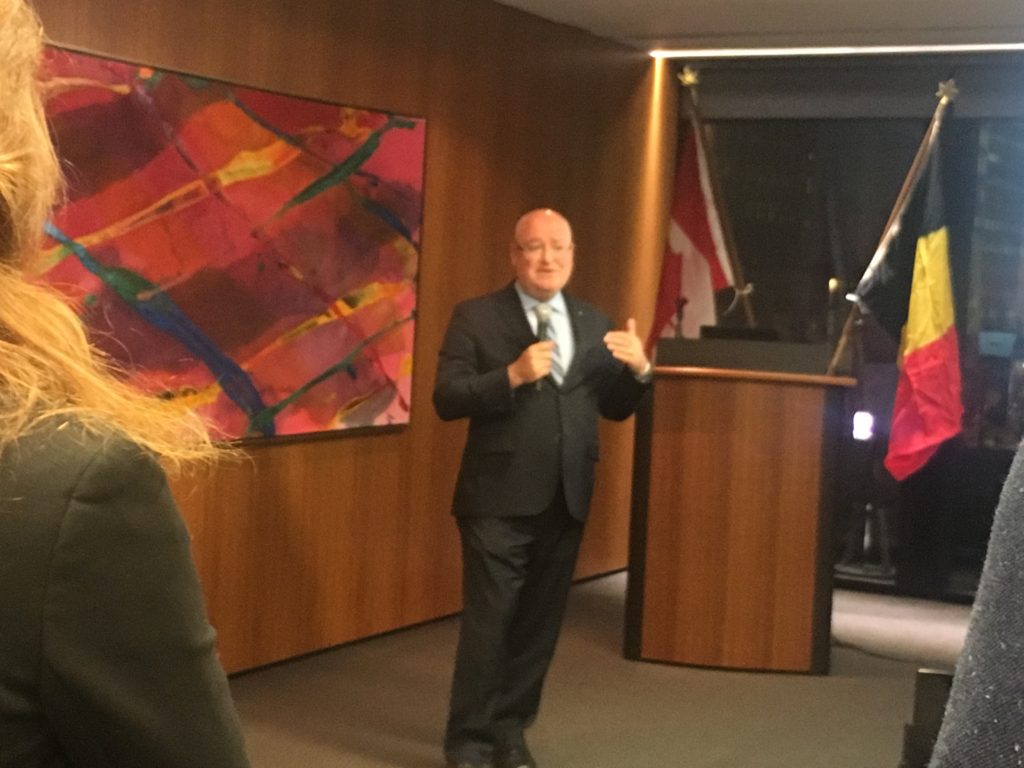On October 15, 2019 Craig Alexander, Partner & Chief Economist at Deloitte Canada
delivered a lecture on the Economic Challenges Facing the New Federal Government to the Belgian Canadian Business Chamber at the Dentons Canada Toronto Dominion Centre offices.
In his opening remarks, he stated “As we approach our national election, most politicians have focused on our internal economy. However, 60 per cent of our GDP involves international trade — imports and exports as well as financial services. Much depends on what happens outside our borders.”
Echoing other economists, he noted that the global economy shows signs of slowing down. Interest rates have fallen. In fact, long-term bonds from several major European countries offer negative interest rates, in essence charging investors parking fees for safeguarding their capital rather than paying them for the privilege.
He also highlighted the other challenges to global economic growth including the continuing Brexit discussions over the terms under which United Kingdom will leave the European Union. Despite an October 31 deadline, no final terms have been announced.
Closer to home, he explains that US President Donald Trump’s approach to protectionism has been haphazard. Starting with increasing tariffs on aluminum and steel imports to the United States, his ensuing trade war with China and others has become a “train wreck” for the global economy. He points out that limiting or increasing tariffs on Chinese exports to the US has hurt his own country not China, since it sells more products to China than it buys from them. In this way, China’s retaliatory tariffs against US imports, have harmed US
agricultural exporters, especially canola farmers.
He concludes that Trump is a not a free trade supporter but someone who seeks to claim victory in a trade war with China. Closer to home, Alexander reminds us that such an approach also led to minor revisions to the 2017 USMCA (United States-Mexico-Canada Agreement), the so-called new NAFTA. Despite Trump’s claim that America came out ahead, Alexander points out that in fact, Canada has enjoyed significant benefits from the policy changes.
As for a possible global recession, he simply pointed to various dark clouds on the
financial horizon. “We’re due for one, he says. “They happen every eight to 10 years. Ultimately, it boils down to how government officials, central bankers and others react to the challenges. Today is different from what happened in 2001 and 2008. In the first, the cause was over-valued tech stocks and In the second it was under-capitalized banks.
“But today, Canadians are enjoying the lowest unemployment rates in 50 years. But the
global economy is growing slowly and its immune system is worn down so that it will likely take less for one to occur.
“We are also facing inverted yield curves [short term bond yields are higher than those
for long-term instruments of the same quality] in many major European financial markets. But such inversions can be a “false signal” since they often lead to recessions but not always.
In his closing remarks, Alexander stated “Canada’s economy is surprisingly resistant. It is continuing to grow but only more slowly.” He also predicted that the federal election will result in a minority government.
Pictures of the evening: https://photos.app.goo.gl/y2jhUzQGLy1qzFJJ7










